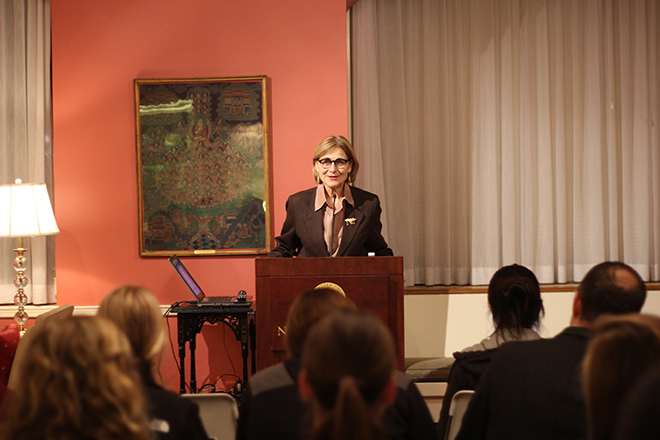
Recent events in Syria have dominated headlines with news regarding air strikes and ISIS, yet the unfolding humanitarian disaster there remains forgotten.
Jacqueline Bhabha, professor of the practice of health and human rights at the Harvard School of Public Health and the director of research at Harvard’s François-Xavier Bagnoud Center for Health and Human Rights, discussed the underrepresented issue of child migration in a speech at Scott Hall on Wednesday night.
Bhabha, hosted by the Buffett Center, outlined the issues facing Syrian refugees and other child migrants to an audience of approximately 50 people, discussing her latest book Child Migration & Human Rights in a Global Age.
Bhabha said the book analyzes “the cost of inaction that results from our failure to put this issue at the center of policies” and why child immigrants continue to occupy what Bhabha calls the “distinctive twilight space.”
"Children are invisible,” Bhabha said. “They consistently fall between the cracks, as they are peripheral both to those who are focused on issues concerning adults as well as those focused on domestic children.”
According to Bhabha, a key area of issue is the legal framework. Over a quarter of Syrian refugee families are headed by mothers, but in Lebanon, where many Syrians have fled, women cannot pass on their citizenship to their children, resulting in many stateless children with no legal identity.
“They have no proof of age, no proof of nationality,” Bhabha said. “They lack the entitlements they have as human beings. They are entitled to attend school, they are entitled to vote.”
Over 60 percent of children are not in school even though education is a basic human right protected by international law, according to Bhabha.
“School is a space of nurture, which is particularly important for children in refugee situations,” she said. “This [lack of education] is an area of massive inaction with enormous costs. This is a potential generation of Syrian children without education and literacy.”
Bhabha said that girls with no education are three times more likely to marry young, and now, Syrian parents are marrying their daughters off at around 15 years of age. This means they are giving birth at younger ages, and also increasing their chances of maternal mortality, according to Bhabha.
On the other hand, Bhabha realizes that there is some ambivalence as to what should be done with refugee children.
“What are the obligations of the Turkish state, [for example], to accommodate the Syrian refugee children in their schools?” Bhabha said. “When you look at the cost of inaction, you have to think about the big picture.”
The big picture includes the lack of humanitarian funding, legal framework, representation and refugee education.
“Why is it possible that we tolerate that 60 percent of this [Syrian] population isn’t getting an education?” Bhabha asked.
Bhabha said the overarching concern is the lack of a prolonged strategy to deal with the increasing amount of child refugees.
“If you think about other precedents – women’s rights, gay rights – social justice depends on mobilization, and children don’t have a political voice,” Bhabha said.